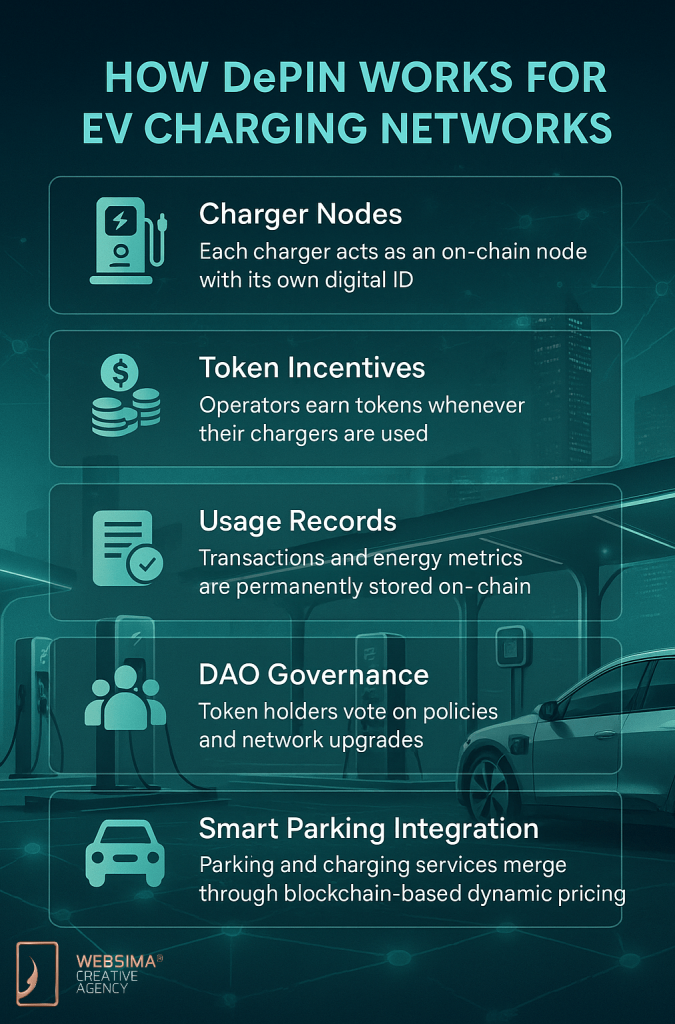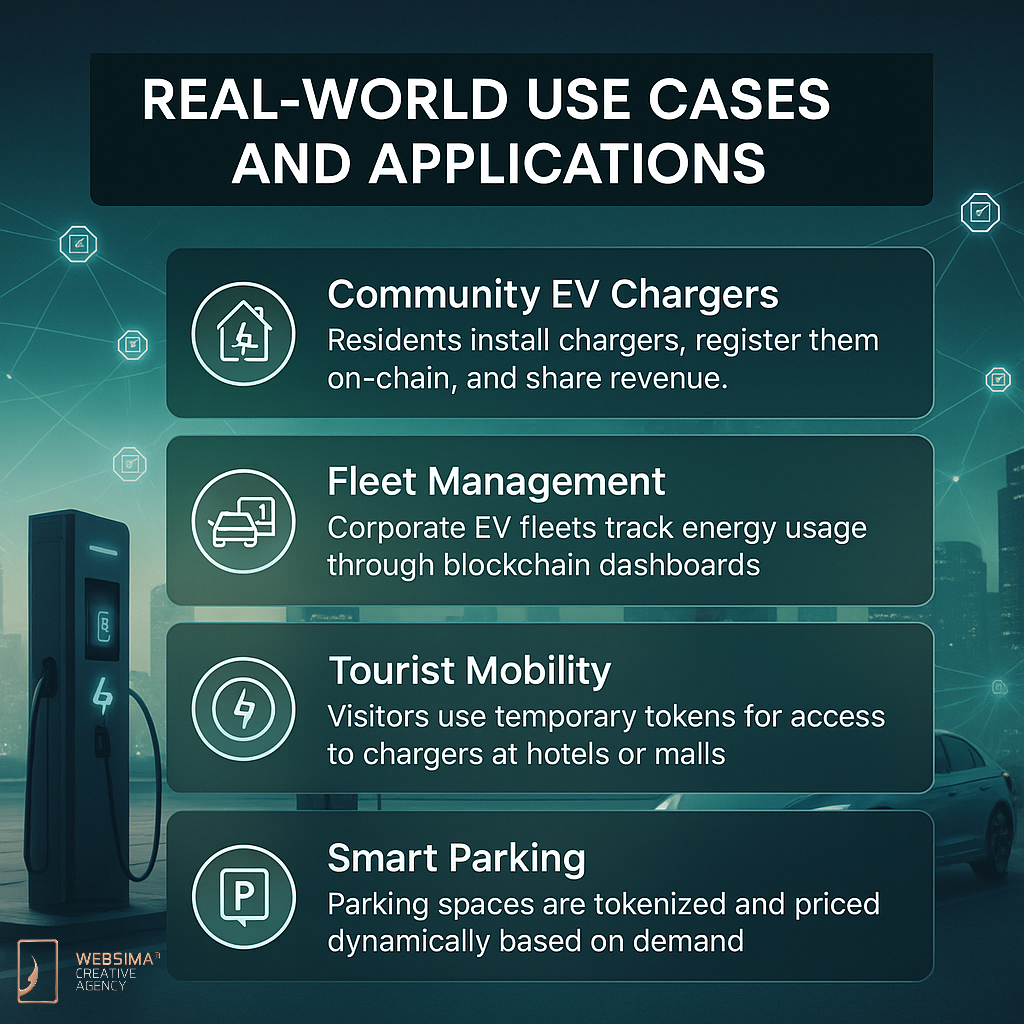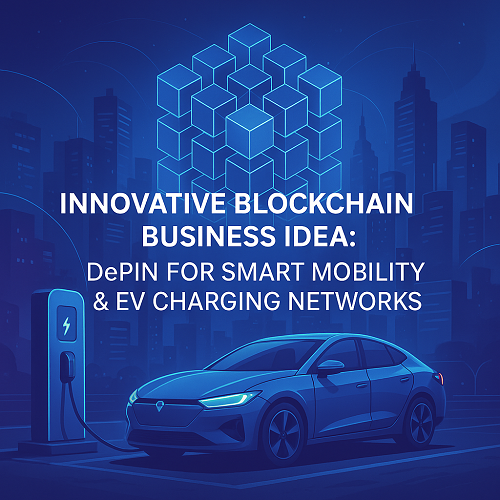Table of Contents
- Introduction: Decentralizing Mobility Infrastructure
- What is DePIN and Why It Matters for Dubai
- The UAE’s Drive Toward Smart Mobility
- How DePIN Works for EV Charging Networks
- Tokenized Incentives and Ownership Models
- Real-World Use Cases and Applications
- Regulatory Landscape for DePIN Mobility in Dubai
- Challenges and Risks to Consider
- Case Study: A Tokenized EV Charging Ecosystem
- Common Mistakes Entrepreneurs Make
- Market Outlook 2025–2030
- Frequently Asked Questions (FAQs)
- Final Thoughts
- Websima’s Role in DePIN and Smart Mobility
Introduction: Decentralizing Mobility Infrastructure
The UAE’s rapid shift toward electric and autonomous transport is redefining how cities are powered and connected.
According to the Dubai Electricity and Water Authority (DEWA), the EV Green Charger Initiative has already deployed more than 370 public charging stations, supporting thousands of electric vehicles across the city.
Yet ownership and control of this infrastructure remain centralized — a challenge that blockchain can solve.
DePIN mobility Dubai proposes a model where communities, property owners, and private investors can deploy chargers and smart-parking nodes, record activity on-chain, and earn tokens for participation.
What is DePIN and Why It Matters for Dubai
1/ The replacement to Cloud is here: DePIN turns GPUs, bandwidth & power into an on-chain marketplace—payments baked in, 85 % cheaper than AWS, owned by the crowd.
It’s the most equitable software rail since TCP/IP. How it works & why it matters pic.twitter.com/eWV3wFafuN
— Jon Radoff /acc Metavert (@jradoff) June 30, 2025
DePIN (Decentralized Physical Infrastructure Networks) uses blockchain to coordinate and incentivize the creation and operation of real-world infrastructure — from EV chargers to IoT sensors.
This approach aligns perfectly with Dubai’s Smart Mobility Strategy, managed by the Roads and Transport Authority (RTA), which aims to make 25% of all trips autonomous by 2030.
Combining blockchain transparency with smart transport planning allows Dubai to create a participatory, data-driven model for sustainable mobility.
The UAE’s Drive Toward Smart Mobility
The UAE Ministry of Energy & Infrastructure (MOEI) reports that EV registrations in the country have grown by more than 60% since 2022 — a trend supported by new partnerships between public entities and private operators.
However, the challenge lies in scaling charging infrastructure efficiently.
A DePIN mobility Dubai model addresses this by letting decentralized stakeholders build and monetize EV infrastructure through blockchain-powered token systems.
How DePIN Works for EV Charging Networks
A DePIN-based EV network uses smart contracts to automate every step — from registering chargers and verifying energy supply to recording user payments.

Core Components
- Charger Nodes: Each charger acts as an on-chain node with its own digital ID.
- Token Incentives: Operators earn tokens whenever their chargers are used.
- Usage Records: Transactions and energy metrics are permanently stored on-chain.
- DAO Governance: Token holders vote on policies and network upgrades.
- Smart Parking Integration: Parking and charging services merge through blockchain-based dynamic pricing.
To understand how physical EV charging infrastructure functions in Dubai today, visit DEWA’s Smart Charging Portal, which outlines existing workflows and public accessibility features — a useful foundation for blockchain mapping.
Tokenized Incentives and Ownership Models
DePIN ecosystems rely on dual-token structures — one for usage (utility) and one for governance.
This lets contributors, drivers, and investors participate in ownership, while ensuring economic balance.
- Operators: Earn from usage and token appreciation.
- Drivers: Get cheaper access and loyalty rewards.
- Investors: Own fractional stakes in charging stations.
- Regulators: Gain auditable access to energy and emissions data.
Real-World Use Cases and Applications

- Community EV Chargers: Residents install chargers, register them on-chain, and share revenue.
- Fleet Management: Corporate EV fleets track energy usage through blockchain dashboards.
- Tourist Mobility: Visitors use temporary tokens for access to chargers at hotels or malls.
- Smart Parking: Parking spaces are tokenized and priced dynamically based on demand.
Regulatory Landscape for DePIN Mobility in Dubai
A DePIN project in the UAE must comply with multiple frameworks, including VARA’s virtual asset rules and DEWA’s energy licensing requirements.
For a clear overview of national readiness and private-sector participation, the PwC eMobility Outlook 2024 – UAE Edition provides key insights into grid demand, investment trends, and infrastructure growth projections.
These insights help startups align blockchain deployments with government-approved smart mobility frameworks and avoid regulatory friction.
Challenges and Risks to Consider
- Licensing Complexity: Compliance with VARA, DEWA, and RTA.
- Hardware Costs: Upfront investment for quality EV chargers.
- Grid Synchronization: Integration with DEWA energy systems.
- Data Residency: Blockchain metadata must remain within UAE jurisdiction.
- Public Awareness: Tokenized models need user education to drive adoption.
Case Study: A Tokenized EV Charging Ecosystem
Imagine ChargeDAO Dubai, a decentralized platform enabling property owners to monetize EV charging stations.
- Each charger is tokenized and tracked on-chain.
- Drivers pay using stablecoins or native tokens.
- Energy usage is recorded transparently.
- Smart contracts instantly distribute revenue among owners and investors.
According to the Messari DePIN Market Report 2025, tokenized infrastructure projects worldwide are expected to attract over USD 10 billion in investment by 2030 — and Dubai is well positioned to capture a significant share of that growth.
Common Mistakes Entrepreneurs Make
- Ignoring Licensing: Failing to secure VARA and DEWA approvals.
- Overcomplicating Tokenomics: Creating unsustainable reward models.
- Neglecting User Experience: Blockchain must be seamless for EV users.
- Weak Partnerships: Avoid building without energy or property partners.
- Skipping Audits: Smart-contract security is non-negotiable.
Market Outlook 2025–2030
Dubai’s Clean Mobility Strategy 2030 aims to install over 80,000 EV chargers across the emirate.
As per the DEWA EV Green Charger Program, adoption rates are climbing each quarter.
By integrating blockchain with IoT, DePIN mobility Dubai can convert this infrastructure into a participatory, data-rich, and self-sustaining ecosystem.
Frequently Asked Questions (FAQs)
1. What is DePIN mobility Dubai and how does it work?
It’s a blockchain-powered model that enables decentralized participation in EV charging and parking infrastructure through token incentives and transparent usage tracking.
2. How can individuals participate in DePIN EV networks?
Property owners can host chargers, register them as blockchain nodes, and earn tokens for every session. Drivers benefit from loyalty rewards and cheaper access.
3. Are DePIN projects legal in Dubai?
Yes — as long as they comply with VARA, DEWA, and RTA regulations governing token issuance, data handling, and smart energy management.
4. What are the economic benefits of DePIN for the UAE?
It decentralizes infrastructure ownership, reduces government expenditure, and aligns with Dubai’s autonomous transport vision under the Smart Mobility 2030 initiative.
5. What challenges must startups overcome in the UAE market?
Balancing compliance, infrastructure cost, and cybersecurity remains key to scaling in the DePIN mobility Dubai ecosystem.
Final Thoughts
DePIN mobility Dubai embodies the next evolution of smart infrastructure — combining blockchain transparency, community ownership, and clean energy.
For Dubai, it’s not just about electrifying cars but decentralizing the entire mobility economy.
By tokenizing EV chargers, parking spaces, and usage data, Dubai can accelerate progress toward its Net Zero 2050 and Smart City 2030 goals while empowering private citizens to become stakeholders in the green transition.
Startups that integrate DePIN models today will lead tomorrow’s sustainable infrastructure revolution — one built on trust, automation, and inclusivity.
Websima’s Role in DePIN and Smart Mobility
At Websima, we help entrepreneurs build compliant, tokenized, and scalable DePIN mobility ecosystems aligned with Dubai’s blockchain and sustainability goals.
We provide:
- Smart contract architecture for EV and IoT integration
- Regulatory structuring (VARA, DEWA, and DIFC alignment)
- Hybrid on-chain/off-chain data compliance solutions
- dApp development for mobility token platforms
Partner with Websima to bring your DePIN mobility Dubai idea to life.
https://websima.ae/contactus/





